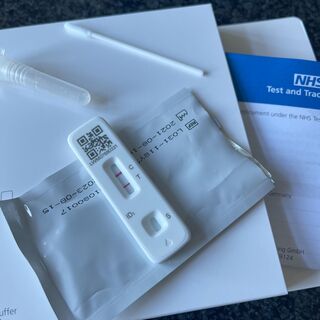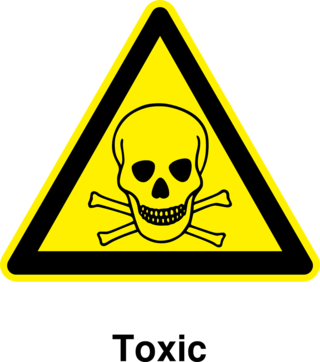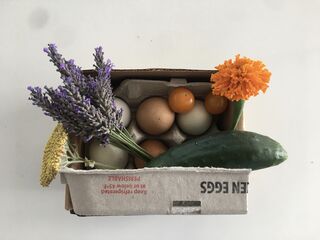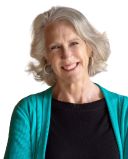Sleep
Living Alone With COVID
A single woman learns the hard way about interdependence and accepting help.
Posted August 1, 2022 Reviewed by Jessica Schrader
Key points
- It's scary living alone in a pandemic.
- Many of us without kids of our own will eventually test positive for COVID and need to quarantine.
- Calamities can be managed when we ask for help.

After 124 weeks of hypervigilance, I test positive for COVID. I live alone, no family nearby. No kids anywhere. Avoiding COVID has been my obsession and great fear. This is not good. Then, on Day 3, I discover a lie I’ve been telling myself for years.
Day 0. I feel a cold coming on. I’m supposed to be hosting a dinner for four this evening. I test, sighing with relief to see one line in the rapid test’s little window, and head to the market. My fridge, which regularly runs nearly empty, soon has pasta salad chilling and sausages ready for the grill.
One of my dinner guests tests positive, her husband texts, so dinner’s off for them. We’re stuck in a heatwave, and their tiny place has no A/C. He’ll sleep outside while she heals.
My date Dave, a chemist, tests negative, too. We go ahead with dinner for two, and later attend a lecture in a big concert hall downtown. Maybe 10% of the audience, including Dave and me, are masked. During the 75-minute talk, I dab at my runny nose and swallow my cough. My sleep is fitful at best.
Day 1. I wake late to a pounding head, deep cough, and clogged nostrils. Following instructions, I wait until 24 hours have passed to take my second COVID test. Almost immediately, two lines pop up, strong and dark in the little window. Though fully vaccinated and thrice boosted, it’s confirmed. I now have COVID.
When I call my physician to share my results, the guy who answers schedules me for a tele-appointment within the hour. Pandemic protocols, once a confusing quagmire, now play as routine.
I’m surprised when the doctor says I qualify for Paxlovid. Like many I know who also don’t have kids, I’m not well-attuned to how old I am. I think that’s because we lack the milestones that attach to the aging of one’s kids and grandkids. For me age is an afterthought, not a relative marker. Today I’m grateful for my years.
While my pharmacy fills my prescription, I call my friend Elsa, my primary medical representative. Just like she’s asked I do in a medical crisis. I’m good at following instructions, not so good at asking for help. She offers to drive 40 minutes to pick up my meds from the pharmacy located one block from my place. I thank her anyway, saying the doc assured me with an N-95 I can do it myself. I feel like hell and focus on getting horizontal.
Day 2. I feel better after 10-plus hours of sleep. At the kitchen sink I take my temperature, which registers well over my normal. As I shake down the old glass thermometer, it slips from my hand and shatters.
Little beads of mercury skitter across the floor. I sweep the shards into a dustpan and vacuum up the dust. I didn’t eat yesterday and am relieved to smell my morning coffee and savor the taste of my first summer peach.
I text Dave my status, mentioning as an afterthought my demolished old thermometer.
Call me right away, he replies.

My cleanup process likely vaporized a cloud of airborne mercury. Dave asks me to open all windows immediately, and turn on the A/C stat. Put on gloves and put everything I swept up outside in a double garbage bag. Sprinkling powdered sulfur on the floor will bind the mercury and render it at least partially inert. He’ll come take care of what needs to be done, he says. Since he lives over an hour away, and I have COVID, after all, I'll try to find some local friends.
I text Elsa, whose office is a few blocks away. Maybe she can stop on her way to work and get some sulfur. When I don’t hear right back, I try two additional friends. Both are willing to help, one can come now.
I locate sulfur at a nearby garden center. Marcia picks it up and drops it at my door 20 minutes later. I call Dave back and follow his directions. After generously coating the kitchen floor with sulfur dust, sucking it up should bind the mercury remaining in the vacuum, he says. Gloves and mask on, I moisten paper towels and wash up the residue, adding the lot to my hazmat bag.
As the temp climbs to the high 90s, I think of my community garden plot. Dave watered it for me on his way home, but with five more days of excessive heat warnings, I need help. I text the young neighbor I enlisted to share watering in exchange for a split of the bounty. My request feels over the top, but I pose it anyway. Of course, she says, and sends me photos of the big cucumber she’ll drop at my door tomorrow.
Utterly spent, I take more pills, collapse, and sleep another 10 hours.
Day 3. I wake feeling better than I did yesterday, though I’m still dog tired. My only remaining task is to research how to dispose of the mercury-tainted detritus—two garbage bags and a throw rug. Loren at Poison Control tells me the vacuum’s gotta go, too, and refers me to Hazardous Material Disposal at my local waste management center.
I’m patched to Miriam, a hazmat supervisor. She compliments the containment efforts we’ve made. Yes, she says, we’ll deal with what’s left. But not until you’re healthy. You all did a really good job, she adds. Day 6 I have an appointment to offload the contaminants.

This afternoon outside my door I find a box containing a cucumber and two cherry tomatoes from my garden, together with six farm-fresh eggs and a smattering of community garden flowers. All this from a neighbor I have met only once.
I’ve now successfully survived three days of COVID by myself.
Hold on. That’s just not true.
This story I’m telling myself is bogus. In three days I count seven friends and eight strangers who have come to my aid, simply because I needed them, because I was desperate and asked.
Everyone I know who doesn’t have kids dreads asking for help. We don’t want to bother anyone and assume their family members need them more than we do. Many of us will go to great lengths to avoid speaking up, putting ourselves at risk, simply to validate the ill-conceived notion we don’t warrant assistance.
That’s just hooey. It’s time to change the narrative and shift from independence to interdependence. The least I can do is accept, at last, that I’m loved and worthy of care. From people I know and in the form of kindness from strangers.
Update: As of Day 4, I continue to recover, filled with gratitude for all that continues to flow my way, especially when I ask for help.




